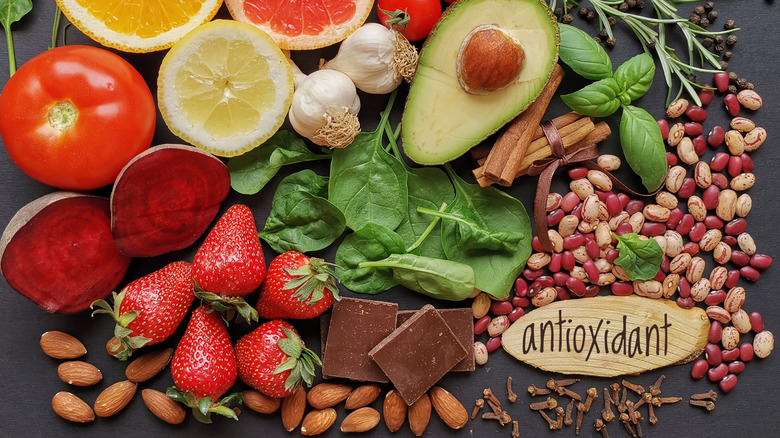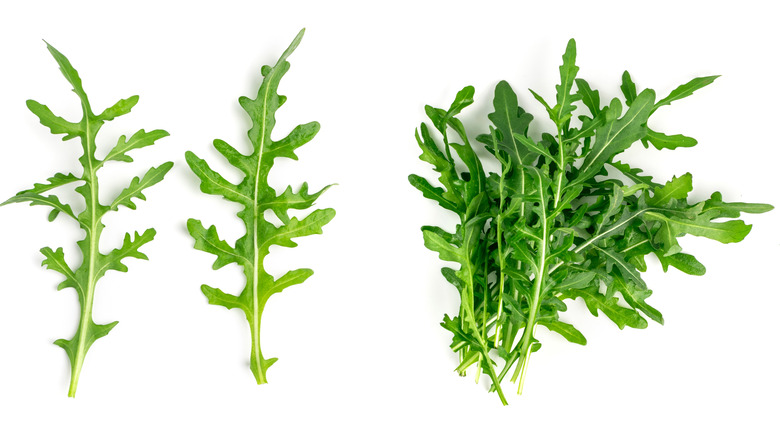What Happens To Your Body When You Eat Arugula Every Day
You may have had this delicious leafy green tossed into a fresh summer salad or sprinkled atop your favorite pizza, but how much do you really know about arugula?
According to Healthline, arugula has its roots in Mediterranean regions, and is a member of the brassica family of plants (which includes cabbage, Brussels sprouts, kale, and bok choy). Arugula was actually used by the ancient Romans as both medicine and an aphrodisiac. In present times, it's well known for its peppery taste, often adding a burst of flavor to dishes, setting it apart from other leafy greens. It has a distinctive look as well, making it almost instantly recognizable.
Other names arugula goes by are "rucola, salad rocket, and Italian crest," according to Healthline. While it can be found year-round in supermarkets, its peak season is in the early springtime and fall. In addition to its unique taste and appearance, arugula offers a number of health benefits, and is high in fiber, nutrients, and phytochemicals. If you want to incorporate more arugula into your diet and are curious about how it might affect you, continue reading to learn more.
Your risk of certain cancers may be reduced
As mentioned, arugula provides a number of health benefits, including the ability to help prevent certain cancers. According to WebMD, arugula is chock-full of antioxidants, which are nutritional compounds that can both help protect against and prevent cellular damage. Another component of arugula that helps against cancer is a compound called glucosinolates — which give the plant its distinctive peppery-bitter taste — and are known to protect against cancers including "breast, prostate, lung, and colon cancers."
Furthermore, a study published by PLOS One found that the element erucin, which is found in large quantities in arugula, actually prevents the multiplication of breast cancer cells, and that its effects on cancer cells are actually comparable to powerful anticancer drugs. According to the study, erucin belongs to the family of chemicals called isothiocyanates, which have been studied at length for their cancer-fighting capabilities. Isothiocyanates are commonly found in other cruciferous vegetables, including cabbage, kale, and broccoli. However, erucin is found in particularly high amounts in arugula.
Your bones may become stronger
Arugula offers a number of essential vitamins and minerals, one of which is calcium. According to Verywell Health, the plant is a significant contributor of this mineral, with a two-cup serving providing nearly 10% of your daily recommended value. The Cleveland Clinic states that 99% of the calcium in our bodies is stored in our bones and teeth, and that the mineral is what makes them both "hard and strong." Experts at the site explain that our bones are actually being remodeled every day, and that calcium is required for this process, especially in our younger years as our bones are developing at a more rapid pace.
When we are younger, our bones are built more rapidly than they are broken down, which helps to increase our bone mass. After the age of 30, this process of bone building slows down until it is about even with bone breakdown. As we age further, bone is broken down at a faster rate than it is built, which can potentially lead to osteoporosis if not enough calcium is consumed. Making sure you incorporate calcium-rich foods into your diet on a daily basis can help prevent the onset of osteoporosis, and the site emphasizes the inclusion of leafy greens in your diet to meet those needs.
You could get a health boost during pregnancy
If you are pregnant and want to make sure you are eating the right foods to meet your folate requirements, incorporating arugula into your diet is an excellent choice. The USDA states that one 100-gram portion of arugula provides 97 micrograms of folate per serving, which is approximately 25% of the daily recommended value (according to the American Pregnancy Association). Experts at the site explain that folate, which is also known as the vitamin B9, is known to support fetal development and to help reduce the risk of birth defects and complications.
You may have heard of women taking a supplement called "folic acid" during their pregnancy. The American Pregnancy Association explains that folic acid is actually a synthetic version of folate typically added to foods and used as a supplement. Healthline states that while many may consider the two to be the same, there are key differences. While the body is easily able to convert folate into its active form in the body, folic acid is not so easily metabolized, and it can actually take a long time for the body to make it available. For this reason, the site recommends getting folate from whole foods, such as arugula, instead. If you are pregnant and find that you cannot meet your needs via your diet, supplementation may be necessary.
You could give your immune system a boost
If you are looking to add some extra vitamin C to your diet via healthy food choices, why not try arugula?
Healthline reports that among the many vitamins and minerals this leafy green offers, vitamin C is one of them. When most people think about vitamin C, their first thought is typically about its use to help cure a cold. While that is somewhat true, experts at WebMD explain that it actually works a little differently. Despite the fact that it may not cure your cold, Dr. Mark Moyad, MPH, of the University of Michigan notes that "[t]here is good evidence taking vitamin C for colds and flu can reduce the risk of developing further complications, such as pneumonia and lung infections." Part of vitamin C's role in the body is to "help protect against immune system deficiencies," which may help prevent contracting a cold in the first place.
According to another Healthline report, vitamin C is an essential vitamin, which means the body cannot produce it on its own. It helps the immune system by boosting the amount of white blood cells in the body, which can help fight infection. Not only does the amount of white blood cells increase by consuming vitamin C, but those cells are also able to work more effectively as the vitamin protects them from damage caused by free radicals.
Your heart health may improve
Incorporating foods that are good for your heart into your diet is pretty much a no-brainer. According to Medical News Today, arugula helps in this category, and is said to have a "protective" effect on the heart. Studies have shown that in particular, cruciferous vegetables such as arugula have been proven to reduce the probability of cardiovascular disease, as well as reduce the risk of atherosclerosis. Atherosclerosis refers to the buildup of plaque in the arteries, which may potentially lead to heart related problems. Medical News Today states that the buildup of plaque in the arteries effectively narrows them, making it harder for blood to pass through. If blood flow is severely restricted, this can lead to both heart attack and stroke.
WebMD further explains how cruciferous vegetables actually help do this by stating that they contain glucosinolates — which give them their distinctive bitter taste — and are known to reduce LDL or "bad" cholesterol. Maintaining proper levels of good cholesterol helps prevent fat from depositing into your arteries, preventing the aforementioned plaque from developing and leading to heart attacks down the line.
You lose or maintain a healthy weight
Luckily, the benefits of arugula extend past its individual vitamins and minerals. According to Livestrong, eating arugula regularly can support weight management and weight loss. This is due to a variety of factors, including the fact that per serving, arugula is extremely low in calories. One serving of arugula contains as little as 5 calories and 0.1 grams of fat, making it a great dietary addition for those wanting to monitor their calorie intake.
Healthline confirms that including leafy greens like arugula in your diet is a great way to lose weight, because they are filled with ingredients that can help you stay full for longer. Experts explain that leafy greens contain a compound called thylakoids, which are known to help you feel full for longer and better manage your appetite. Loading arugula on top of a hearty salad is a surefire way to make sure you're getting enough fiber for the day, which, according to Healthline, is another element in leafy greens that helps you stay fuller for longer. For those who are looking to decrease belly fat, there is good news: experts say that fiber has been shown to specifically target the fat in this region, which is linked to certain metabolic disorders.
Your eye health could improve
If you were wondering if improving your eye health could be as simple as tossing a few arugula leaves onto your salad — you'd be right.
Yet another reason arugula stands out as a health star is for its high quantities of vitamin A, which is known for its ability to help improve your vision. According to Verywell Fit, a two-cup serving of arugula contains 20% of the daily recommended value of the vitamin. The American Optometric Association states that vitamin A helps the eye's ocular surface to function properly and contributes to the formation of rhodopsin, a pigment in the retina that enables us to see at night. For this reason, night blindness is often one of the first symptoms of being deficient in vitamin A.
Furthermore, the American Academy of Ophthalmology explains that vitamin A helps nourish other parts of the eye, including the cornea, and that proper levels of the vitamin ensure that the eyes stay lubricated. The site also mentions that a lack of sufficient vitamin A is the "leading cause of preventable blindness in children" at a global level, and that upwards of 500,000 children go blind each year because of it.
You could be working against blood thinners you may be taking
One of the less desirable side effects of eating a lot of arugula is that it may interfere with some medications. The class of medication in question here is blood thinners, and according to Penn Medicine, it's the high amounts of vitamin K in arugula that has been known to cause trouble.
One of the reasons people take blood thinning medications is to help prevent blood clots. However, vitamin K is used in the body to help clot blood, which could create problems for those who are already at risk of experiencing blood clots. Warfarin, a popular blood thinning medication works by interfering with the process initiated by vitamin K, and for this reason, it's important for people to closely monitor their vitamin K intake and make sure it's consistent each day for the body to make proper adjustments.
Fran Burke MS, RD, a clinical dietitian in the Preventive Cardiovascular Program at Penn Medicine, spoke to the University's website and shared that " if you eat one serving of broccoli on one day, you should plan on eating one serving of a high vitamin K food the next and so on. One serving a day, several days a week would help to keep your vitamin K intake consistent."
You might lower your high blood pressure
Another superstar vitamin in arugula is potassium, and adding it to your diet is a surefire way to reach the daily recommended value of 1,000 to 1,200 milligrams.
According to the American Heart Association, foods that are rich in potassium help manage high blood pressure because potassium "lessens the effect of sodium" in the body. Essentially, the more potassium you have in your diet, the more sodium you excrete through your urine. Harvard Health experts explain that the American diet is typically rich in sodium and low in potassium, which can lead to high blood pressure — and thus, heart attack, stroke, and heart disease.
Furthermore, the site says that potassium helps with both nerve and heart function by relaxing the walls of your blood vessels, thus allowing more blood to flow through, lowering blood pressure as well as muscle cramping. For adults who have high blood pressure, the American Heart Association suggests increasing your potassium intake via your diet. If you want to boost your potassium intake even further, toss arugula leaves into a salad with spinach — another leafy green that contains high levels of potassium — and maybe even toss in some spinach and avocado to quadruple the effects.
You'll be adding antioxidants to your diet
Antioxidants are kind of a big deal. They're a health superstar in many ways, helping the body perform a variety of functions and protecting it against damage. Thankfully, arugula is packed with antioxidants, so meeting your daily recommended value won't be hard if you have it on hand.
Some of the antioxidants that can be found in arugula include vitamin A and vitamin C. Per Medical News Today, antioxidants can either be natural or artificial. Interestingly, the body does actually produce some levels of antioxidants on its own. Antioxidants produced by the body are called endogenous antioxidants, and those that are consumed are called exogenous antioxidants.
The primary role of antioxidants is to help reduce oxidative stress in the body, which is linked to a number of diseases including cancer, heart disease, immune disorders, and Parkinson's disease. Oxidation develops as a result of the buildup of free radicals in the body. Free radicals are essentially waste the body produces after it processes food and "interacts with the environment." Foods such as arugula that are high in antioxidants help to scavenge the excess free radicals that the body cannot clear on its own, thus protecting against cellular damage caused by oxidative stress.
Eating arugula could help you stay regular
Another positive side effect of regularly eating arugula is that it could help you stay, well... regular.
As mentioned, arugula contains fiber, which plays a major role in digestive health. According to the Mayo Clinic, dietary fiber, which is the fiber found in "fruits, vegetables, whole grains, and legumes," is widely known for its constipation-relieving abilities. Dietary fiber refers to the components of the plant that are unable to be digested or absorbed by your body. There are two classes of fiber found in food: insoluble and soluble. The type of fiber that arugula contains is soluble fiber, which means it helps push food through the digestive tract, thus improving digestion for those who struggle with irregular bowel movements. More specifically, this type of fiber can "increase the weight and size of your stool" and make it softer, which makes it easier for it to pass.
As an added bonus, the fiber found in plants like arugula can also reduce the probability of hemorrhoids and even colorectal cancer.
It may reduce your risk of developing diabetes or help manage it
If you happen to have diabetes, or are doing what you can to make sure you don't get it, including arugula in your diet may be helpful.
Experts from Medical News Today confirm that eating a diet that is high in vegetables such as arugula is an excellent form of protection against developing type 2 diabetes. A study published by the Journal of Diabetes Investigation reports that leafy greens and cruciferous vegetables in particular are linked to lower risk of developing type 2 diabetes. Even more, another study published by Pharmaceutical Biology tested arugula extract on "mouse skeletal muscle cells," and found that the extract had an anti-diabetic effect on the cells.
Additionally, the fiber content found in arugula and other leafy greens can actually help manage blood sugar and improve insulin resistance in those who already have diabetes. Per the Centers for Disease Control and Prevention (CDC), due to the fact that fiber is not broken down by the body, it prevents you from experiencing spikes in blood sugar like other starchy foods, and can generally help keep your glucose levels in a stable range.
As previously mentioned, fiber can help keep you full for longer, which means less overeating overall. The Cleveland Clinic explains that being overweight can actually contribute to type 2 diabetes, so managing your weight by eating more fruits and vegetables may help prevent the onset of the disease.
The best way to eat arugula
Finally, the fun part. If you've read this far and are thinking "this is all great information, but how can I actually eat this vegetable?" — well, get ready to take some notes.
Thankfully, arugula is a very versatile green, and finding ways to incorporate it into your diet isn't that hard. Starting off with something fresh, if you're looking for a way to cool down during the summer months, this zesty gazpacho may be a great way to do it. The recipe calls for cucumbers, arugula, aromatic herbs, salt, water, and oil to be blended together for the perfect summer soup. The arugula gives this gazpacho a peppery kick, which is nicely balanced out by the cool cucumber.
If you are looking for something a bit more hearty, there's also this perfectly seasoned strip steak laid atop a bed of arugula and parsley. To knock out this recipe, start by seasoning 1-inch thick New York Strip steaks generously with salt and pepper. Place them on the grill and cook to medium rare. Next, prepare the arugula salad by tossing it with onion, caper berries, parmesan, and parsley, and then dress it with lemon, olive oil, salt, and pepper. Slice the steak and lay it over the bed of greens, and you've got the perfect salad.














